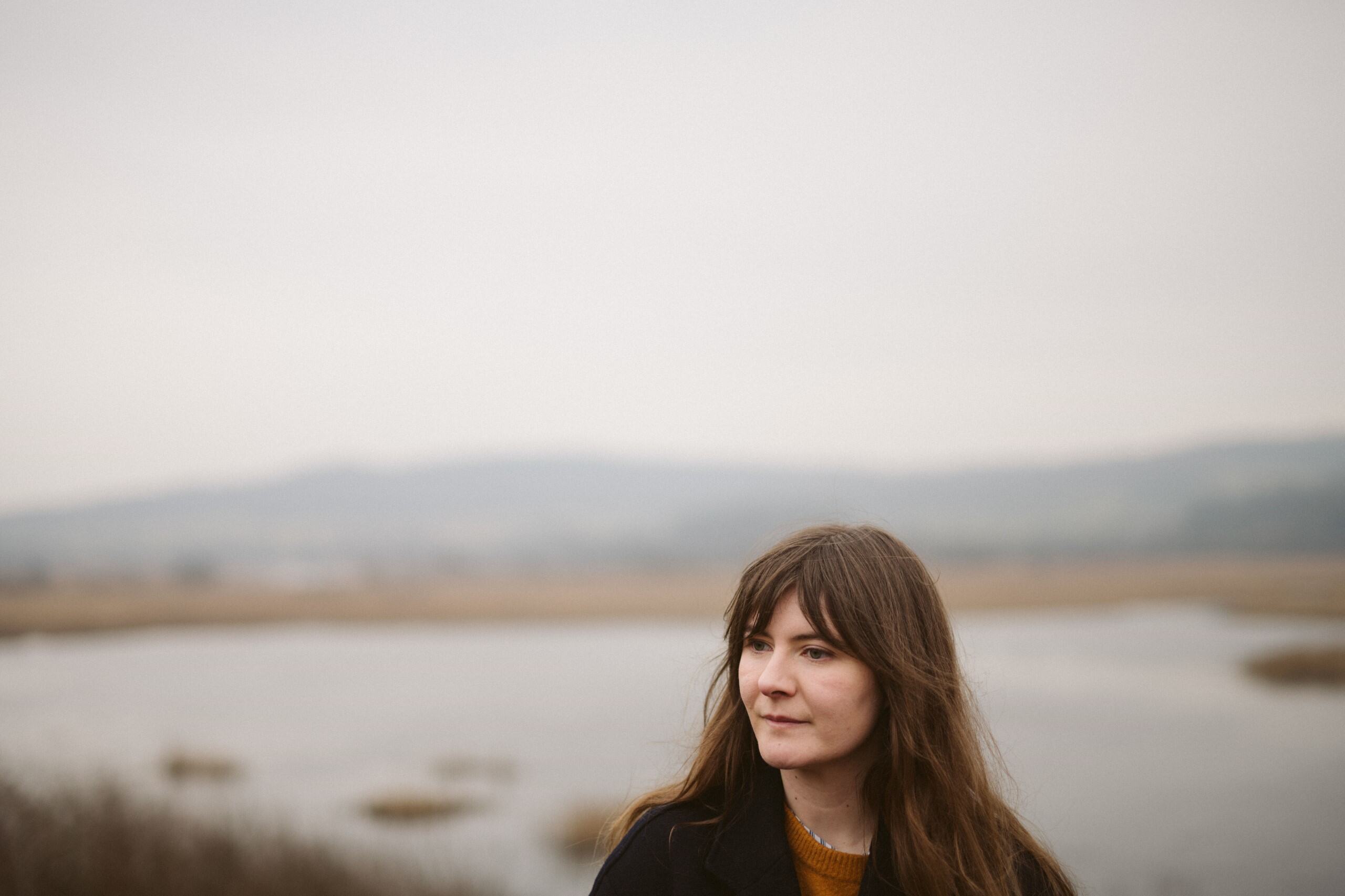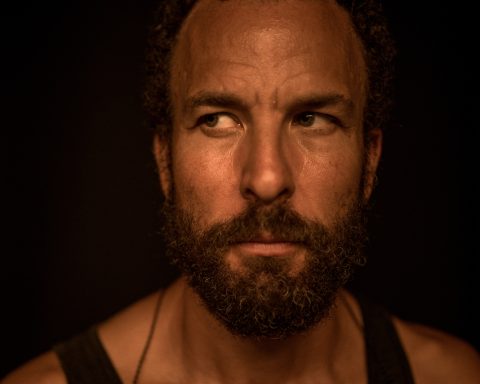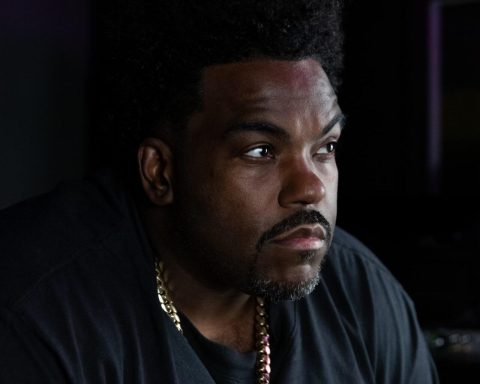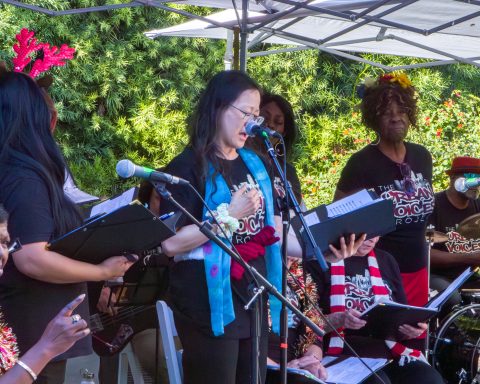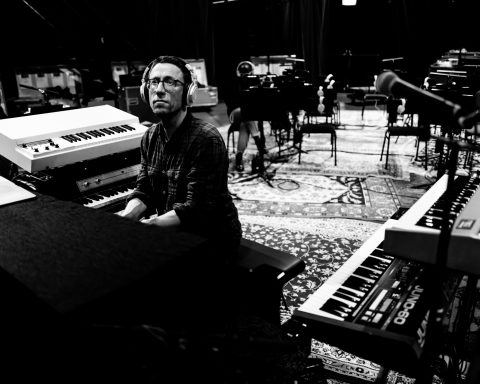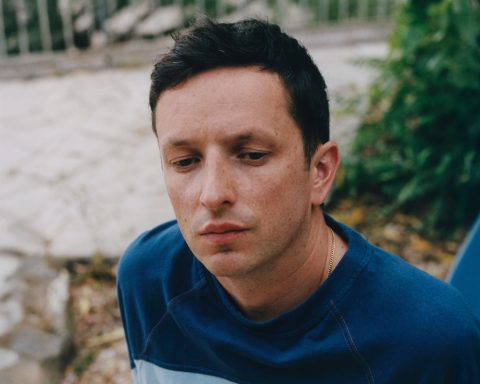The haunting sound Lucy Gooch conjures with her voice plucks at something ancient in the listener. Her layered compositions grow patiently, like an English garden reaching for the sun during the dark days of winter. Praised by Pitchfork, The New York Times, and KEXP, Gooch’s debut Desert Window arrives via venerated UK label Fire Records (Pulp, Spacemen 3). Tracks like “Jack Hare” and “Clouds” explore the intersection of folk and electronic music for our complex, hyper-connected times. The wandering artist speaks about early musical memories, capturing fleeting ideas, and how place influences her writing.
Musical Upbringing
What are some of your earliest musical memories?
That’s a cool question. It would have been a mixture of English choral stuff and ’80s synth. I was born in the ’90s, so I heard ’80s music on the radio in the car. My mom took me to choir, so I got exposed to arty music and religious stuff.
Considering your mother’s influence, do you have a formal choral background?
I wasn’t trained or anything, but I ended up in a youth choir in the countryside where I grew up. That was my entry point into singing. You’re one of a crowd, and you learn about breathing and the physiology of singing. I naturally enjoyed that as a form of self-expression. Then I also ended up being in religious choirs, even though I’m not religious. Going out to rural places had a different flavor.
Avoiding the Mundane
Do you start songs with vocalization, or is the process always different?
I try to improvise as much as possible and catch more subconscious, interesting stuff I’m not dictating or controlling with my more conscious self. That’s why I keep it very loose. I try to get cool vocal performances, even if they’re spontaneous, then pick certain bits to develop. It’s a way to avoid doing mundane, pedestrian, and boring things.
Does your environment shape the musical outcome?
“Jack Hare” started as chanting. I was walking around the outskirts of Bristol and going under flyovers and tunnels. It’s very hilly and green—you get a lot of rain there. It’s very lush, and I remember summers of singing outside, which I would record on my phone.
"I try to improvise as much as possible and catch more subconscious, interesting stuff I'm not dictating or controlling with my more
conscious self."
The Power of Pain and Rumination
How does the studio factor into your recording process?
After a lot of pain, I realized that if you go to a studio with a good voice, that’s that. I think I was doing a lot of developing a home, and getting stuck. The dream is to try and capture some of these things you’ve been developing as a lovely performance, and then start finessing the composition.
On Desert Window, you sound like an artist who has been living in these soundscapes for a long time. Is this a vision you’ve been holding onto for a while?
I’ve been working with the same people for quite a while. We first recorded together in 2019, when we did two EPs. This time was a process of trying to do something that felt more sophisticated, a more expansive sound world. It took about 2 1/2 years and a lot of ruminating on my part and the producer Alistair Lax ruminating on his string arrangements, which are very muscular and quite thick.
A Choir of One
There is a medieval folkish mood to your music. Is the natural world an inspiration?
I hope that’s coming through. Landscape’s quite a big thing. Not necessarily directly, but because I was moving around the UK with my partner for his work. He’s a climate scientist. I think that has informed the sound of it—the kind of darkness and the light.
Now, you are a choir of one; you create all this sound by yourself.
I started with the BOSS DD-7 and a reverb, and I would just loop. I still do it to this day. It’s my favorite way of writing music. I love the ham-fisted method of cancelling your loop because I‘m not elegant. But I like the DIY quality. Sometimes, it’s a big mess, but I still prefer that for writing.
"I like the DIY quality. Sometimes, it's a big mess, but I still prefer that for writing."
Human Journey
Your music is very human. Do you consider yourself to be creating electronic music in some way?
I gravitate to music that’s more human, and I don’t particularly seek out electronic music. Since I first started looping guitar and vocals, it’s been like going on a journey from little BOSS pedals to a big pedal. Then I realized I needed to start recording, that you could get a lot more detail and humanity out of the layers of the voice.
Do you recall people’s reaction to your music in the beginning?
When I first sent demos to people, one well-known person said, “The guitar stuff isn’t great, but the vocal thing—this has something to it.” Sometimes, even when being harsh, people can give you a little direction that helps you see yourself differently.
Transplanted Into a Different Place
You spent two years tracking Desert Window. Was it all recorded primarily in the same place?
No. I was recording stuff at home, and I was determined to take quite a few of the songs into the studio. So we ended up going to Invada studio in Bristol. It was winter in a very industrial setting by the river.
Living in a city like that is kind of heavy—walking around a lot, not having much money, and just being like, “What the hell am I doing?” We recorded a bunch of the songs there, and then I did a bit more in Norwich, in different people’s houses.
Your Instagram has many pictures of the Roland SH-201. Is it a big part of the record’s sound?
Yeah, that thing’s crazy. I wrote a lot of string stuff on the SH-201 because I can noodle around and compose something. I also used a Prophet; it’s a mixture of those two. But I prefer the Roland for writing because it’s got more freedom.
"You have to find ways to live in the moment and be present, no matter where you are."
What have you taken from each place you’ve lived that became a part of your music?
Moving around loads and then being trapped in your home as well. Like in the pandemic, not being able to see people, being confined, and then making these huge cross-country journeys on trains to see your families, friends, and things. And then you’re being transplanted into a different place.
I take a heaviness from Bristol. I associate it with amazing things, but also things like the pandemic. The same goes for my hometown. You have to find ways to live in the moment and be present, no matter where you are. That’s what I was wrestling with a lot on this music.
